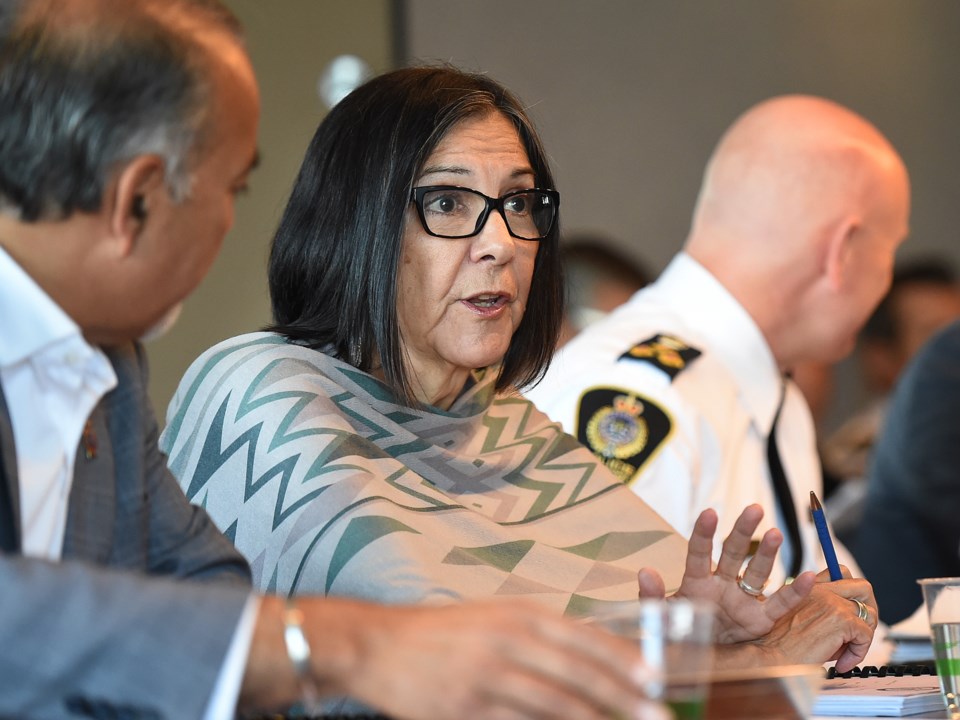Wendy John always has a lot to say.
Which, from a reporter's perspective, is refreshing when someone as articulate as John and not afraid to speak her mind switches on a microphone in a public arena.
She did exactly that at the beginning of last Thursday’s Vancouver Police Board meeting, which happened to be held at the Musqueam Cultural Pavilion on the band’s reserve in the southwest of the city.
John is a former chief of the Musqueam and the newest member of the police board, which from time to time meets at a spot other than the VPD’s Cambie Street precinct.
The reserve is her home.
She has lived there 65 of her 70 years and seen the area go from no running water, no indoor plumbing and dirt roads to a community that Assembly of First Nations Chief Perry Bellegarde told her recently no longer resembled a stereotypical reserve.
John agreed.
But, as she explained, there is more work to do to continue building the band’s economy and addressing its social issues, which is an area she focused on in her nine minutes at the microphone.
John told an audience that included Police Chief Adam Palmer and Mayor Kennedy Stewart of some of the challenges that continue to face the community.
“It doesn’t show when you drive through [a place] like this, but you can talk to any of the [Musqueam] safety patrol that are sitting here and they’ll tell you they’re dealing with the same kinds of things that the police are dealing with outside [the reserve],” said John, who is the band’s chairperson of intergovernmental affairs.
The band still has high rates of alcoholism, drug addiction and problems with violence, she said, referring to the drug-fueled mayhem in the Downtown Eastside in her comments.
“The young people here are getting caught up in places in the Downtown Eastside, and what they’re doing is they’re bringing the Downtown Eastside here,” she said.
“So they make relationships in the Downtown Eastside because of the feeling of connectedness [to other Indigenous people] – I believe that’s what happens, I’m not sure, I haven’t done a study – but we’ve got so many people coming in to the community now that it’s almost unmanageable.”
She continued.
“I mean the kind of drug dealing, the kind of violence, the kind of…,” she said, pausing before shifting to another thought. “I think the action of the people who come in is really frightening to our young people.”
She praised the relationship the VPD – and its rotating number of well-respected liaison officers working on the reserve – has developed with the community and the band’s safety patrol.
But it’s still a sore point with John that the Musqueam is the only First Nation in Canada that pays for its own policing services – particularly, she added, when an RCMP detachment is located on the University of B.C. campus, “only eight minutes” from the reserve.
“I think it’s unfair,” said John, whose brother Wayne Sparrow is the band’s current chief and son, Wade, a former police board member.
“I really do support our relationship [with the VPD], but I think it’s wrong that Musqueam is the only community out of 600 [nations] that has to pay to have policing.”
From there, she mentioned a question that she was posed over lunch. She didn’t say who posed the question, but she looked over at board members as she spoke.
The question: If the Musqueam has a reserve in Vancouver, and so many of the homeless and addicted in the Downtown Eastside are Indigenous, then why not make room for them here?
Her answer: “Well, for one, we are the smallest reserve in the country, so are land base is really small and we have 200 people on our waiting list waiting to get into a house.”
At the close of her speech, she wanted to clear up some misconceptions about the Musqueam related to home ownership, taxes and education.
“There’s a misconception that we get free housing. We don’t get free housing, we don’t get free education. We pay our taxes. All of those things are a misunderstanding of the general public, and we struggle with that every day.”
John was sworn in as a board member back in July. She can serve up to four years, and another two after that if she is reappointed.
John's full speech can be viewed here. It begins near the 13-minute mark.
@Howellings.
.



